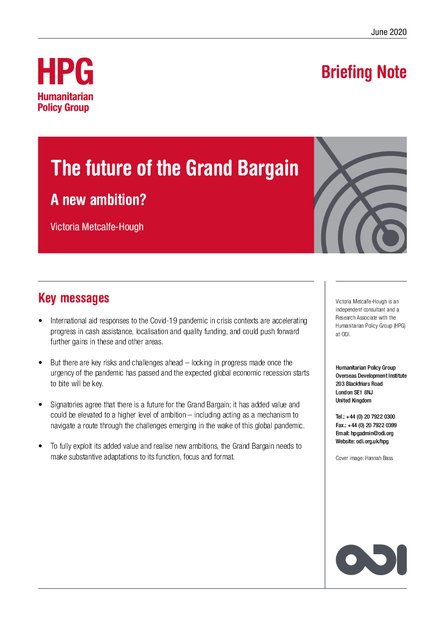
The Grand Bargain – an agreement between donor states and international humanitarian organisations, including the UN, the Red Cross Red Crescent Movement (RCRCM) and international non-governmental organisations (INGOs) – was launched at the World Humanitarian Summit (WHS) in May 2016. Based on the recommendations of the UN SecretaryGeneral’s High Level Panel on Humanitarian Financing, this multi-stakeholder mechanism was intended to institute a series of changes in the policy and practice of international aid actors that would bring greater efficiencies in the response to humanitarian crises (HLP, 2016). Progress against the original commitments has been mixed: there has been a system-wide shift in policy and practice on the use of cash assistance; localisation has become an established principle, if not yet practice, of international humanitarian action; the majority of signatories are reporting some of their humanitarian funding and activity data to the International Aid Transparency Initiative (IATI) Standard; and there is now proof of concept for a harmonised and simplified approach to narrative donor reporting. But efforts to reduce management costs and scale back donor assessments have been minimal, and realising the ambition of a participation revolution – in which affected populations are afforded genuine influence over the international response – is still far off.
Four years into its tentative five-year timeframe, discussions among the now 62 signatories to the Grand Bargain have turned to whether and how the mechanism should continue after 2021. There is general consensus that the Grand Bargain should continue in some form and that it has yet to reach its full potential. But there is much disagreement on what its future function, focus and format should be. These discussions are happening at a time of extraordinary complexity in the aid world. The Covid-19 pandemic continues to spread around the globe, its impact severely compounding the needs and vulnerabilities of people living in the midst of conflict and disaster, and global and national efforts to tackle it are affecting how international humanitarian actors can respond in these contexts.
This paper was commissioned by the UK Department for International Development (DFID) on behalf of the Facilitation Group (FG) of the Grand Bargain. It sets out some key considerations on how the response to the Covid-19 pandemic in crisis contexts could spur further progress against the original goals of the Grand Bargain.